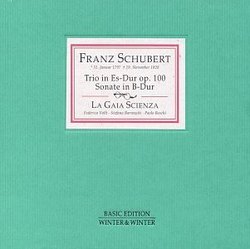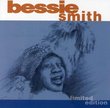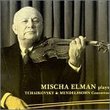| All Artists: Franz [Vienna] Schubert, Gaia Scienza, Federica Valli Title: Franz Schubert: Trio in Es-Dur, Op. 100; Sonate in B-Dur Members Wishing: 1 Total Copies: 0 Label: Winter & Winter Release Date: 8/7/2001 Genre: Classical Styles: Chamber Music, Historical Periods, Classical (c.1770-1830) Number of Discs: 1 SwapaCD Credits: 1 UPC: 025091000623 |
Search - Franz [Vienna] Schubert, Gaia Scienza, Federica Valli :: Franz Schubert: Trio in Es-Dur, Op. 100; Sonate in B-Dur
 | Franz [Vienna] Schubert, Gaia Scienza, Federica Valli Franz Schubert: Trio in Es-Dur, Op. 100; Sonate in B-Dur Genre: Classical
|
Larger Image |
CD DetailsSimilar CDs |
CD ReviewsBelieve Me, You've Never Really Heard It! Giordano Bruno | Wherever I am, I am. | 07/22/2010 (5 out of 5 stars) "Franz Schubert's Trio in Es-Dur, op. 100, for fortepiano, violin and cello, I mean. Oh, I suppose you think you know it well enough, since it's a staple of the piano trio repertoire. You may have encountered it in concert halls. You may have had recordings of it in your collection for years and years, probably one by the Beaux Arts Trio, or by Ashkenazy/Zuckerman/Harrell, or on historical instruments by Bylsma/Beth/Immerseel. I have those three myself, and I've enjoyed all three at one time or another. But hearing this performance by La Gaia Scienza ( it's hardly brand new, it was recorded in 1996!) has confronted me with the realization that I'd never heard all of it, never heard its full magnificence, never heard "what Schubert must have heard" at his most successful public concert in Vienna in March 1828, when this Trio was the culminating work.
So what wasn't there in other recordings? Balance, first of all, between the dynamics and the inherent timbres of the two bowed strings versus the piano. La Gaia Scienza used a restored fortepiano built by Johan Schanz of Vienna, which Schubert himself played and esteemed, now in the collection of the Villa Medici-Giulini, and string instruments likewise restored to the manner of Schubert's era. The fortepiano is a lighter-framed, lighter-strung instrument than the modern piano, with considerably less sympathetic resonance. The action is quicker, the notes decay quicker, the overall sound is far less 'grand'. It can sound -- I know from experience -- disappointingly wimpy in a modern concert hall, almost like a toy piano. But here's the paradox: a recording made of chamber music, made in a chamber, is a different matter from a live concert, and the lack of "grandness" of the fortepiano becomes an asset. In performances of Opus 100 on 20th C instruments, the piano often overwhelms the strings, so that the pianist must restrain his dynamics and the fiddlers must at times overload their strings. Imbalance between the piano and the cello/violin hides the beauty of Schubert's music, and that's what I mean when I say you can't really hear the piece. Federica Valli, playing the forte piano, is able to match dynamics with her fiddler partners, from pianissimo to the most exuberant fortissimo of her keyboard. Instead of the 'cautious thunder' of Ashkenazy's modern piano, Valli's fortepiano can whisper or roar without squelching the transparency that allows the strings to be heard in balance. This CD is as potently convincing an argument for the value of 'historically informed performance' on original instruments as anything I've ever heard. But I mentioned a previous performance on original instruments, by Bylsma/Beth/Immerseel, didn't I? That's another issue, the level of interpretation, on which it seems to my ears that I'd never heard all the brilliance of Opus 100 before listening to La Gaia Scienza. Instead of that mawkish, moony, wounded Boy Schubert - the caricature bequeathed us by late romantic biographers and novelists - the Schubert you'll hear from Gaia Scienza is confident, defiant, exultant. Remember that Schubert wrote and chose this trio for his most ambitious assertion of his musical stature to his contemporaries. It's proud, lusty, Promethean music. It's Schubert's declaration of his claim to the mantle of Beethoven, and in fact it resonates with echoes of Beethoven's own trios and symphonies. Any 'darkness' in this music is not the darkness of melancholy morbidity but rather the defiance of a composer unafraid of the dark. Naturally, a bold re-interpretation of a familiar work has to be accomplished by fine musicianship. La Gaia Scienza has the musical mastery to support their boldness. Valli's fingerwork is immaculate and exhilarating. Paolo Beschi's tone on his cello (a Stradivarius reproduction) is resplendently vocal. Stefano Barneschi binds the cello and the distinct registers of the fortepiano into a truly integrated trio of musical voices. I've also reviewed a CD of La Gaia Scienza performed music by Johannes Brahms, which I found equally revelatory. It's a shame that this ensemble has made so few recordings and gotten so little acclaim in America. This is a CD you must acquire." |

 Track Listings (5) - Disc #1
Track Listings (5) - Disc #1

